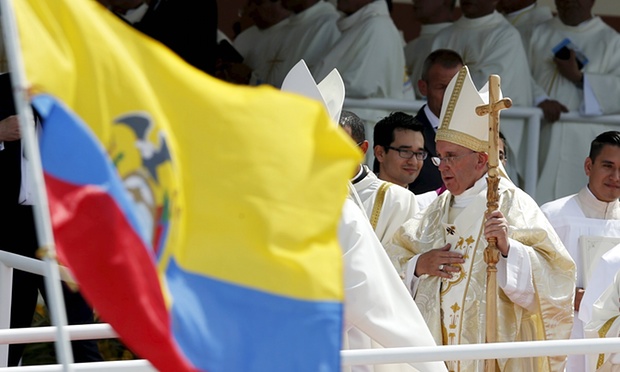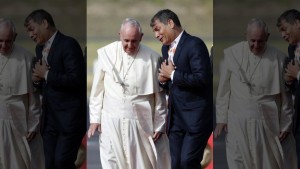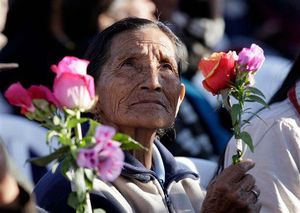Pope Francis Returns to South America, Calling for Climate Justice for the World’s Poor
Jul 12, 2015
Posted in Climate change, Environment, Equal Rights/Equity, Uncategorized, World News
He says government should include indigenous groups, people of African descent, women in decision-making

Pope Francis arrives in Ecuador. Photo courtesy of the Guardian
By Tulio Ospina
Pope Francis arrived in Ecuador on Sunday, visiting his home continent for a three-country tour that includes Bolivia and Paraguay.
The pope’s visit to Quito—Ecuador’s capital city—attracted over one million people who traveled from across the country and camped out overnight to get a good view of the pontiff.
The pope, who is Argentinian, had been expected to address the exploitation of the Amazon—the planet’s most ecologically important rainforest—following the release of his extensive encyclical on the environment.
The encyclical reveals his deep scientific, economic and social knowledge surrounding the causes and effects of “the harm we have inflicted on [the planet] by our irresponsible use and abuse of the goods with which God has endowed her.”
In accordance with Francis’ concern for the poor, the encyclical asserts that while human-induced global warming—based on “a very solid scientific consensus”—concerns all people, “its worst impact will probably be felt by developing countries” and the world’s neediest populations.

Ecuador’s President Rafael Correa, right, welcomes Pope Francis upon his arrival at Quito Airport, Ecuador, Sunday, July 5. Photo courtesy of Fox News

Pope visits nursing home in Quito, Ecuador. Photo courtesy of the Associated Press.
Known informally as “the pope of the poor,” his visit to the region has focused on a message that uplifts family values, communal love and unity.
“The people of Ecuador are beyond excited and pleased, the majority of them being Catholic,” said Azalia Cruz, a Post correspondent in Quito. “In Quito, it was extremely cold, and it was raining a lot when he arrived. Despite this, thousands of people gathered to greet the Pope.”
In one of Latin America’s oldest Catholic churches, Francis pressed a variety of issues,
Addressing ecological concerns, he reminded the Ecuadorean people that “when exploiting Ecuador’s natural resources, the focus should not be on instant gratification” and that appropriate environmental caution and gratitude must be paid when managing these resources.
“Groups of environmentalists opposing petroleum extraction in the Amazonian Yasuní National Park were trying to get a letter to the pope to get a statement out of him,” said Cruz.
These groups have come together in protest to Ecuadorean President Rafael Correa’s intention to open the park’s untouched interior for oil extraction, which will strongly affect the lives of the region’s indigenous tribes and the environment around them, as it has in the past.
Over many years, Ecuador and it’s peasant and indigenous populations have been involved in ongoing international legal battles with Chevron, accusing the oil company of deliberately dumping more than 18 billion gallons of toxic wastewater and 17 million gallons of crude oil and leaving behind hundreds of open pits filled with hazardous waste.